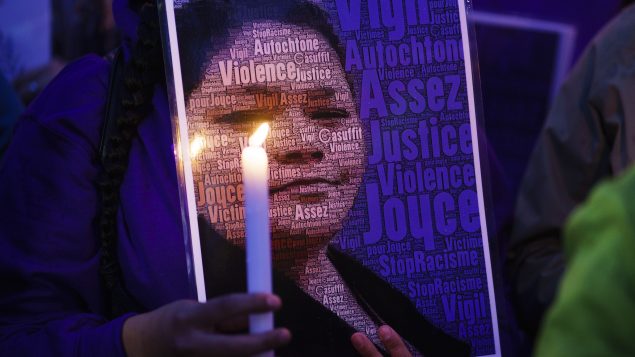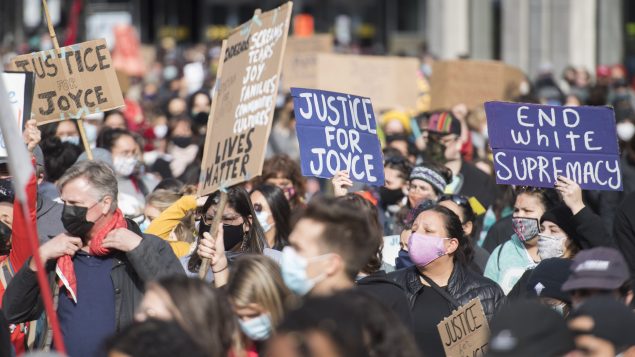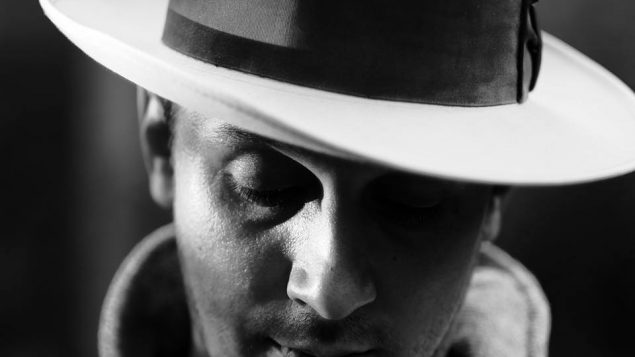Among the numerous Quebec artists that have raised their voice following the passing of Joyce Echaquan, a 37-year old Atikamekw woman who died in a public hospital after being insulted and humiliated by nurses, Algonquin rapper Samian is one to be heard. As Canadians are celebrating Thanksgiving, this is a reminder that the first white settlers owed their life to the Indigenous people who fed them.
Born in Abitibi, in the woodlands of northwestern Quebec, from a white Québécois father and an Algonquin mother, Samuel Tremblay, better known as Samian, has always fiercely supported Canada’s Indigenous people.

A picture of Joyce Echaquan is seen during a vigil in front of the hospital where she died in Joliette, Quebec. on Tuesday, September 29, 2020. Nurses were fired after insulting Echaquan. The Indigenous woman filmed the whole scene and passed away a few hours later. (Paul Chiasson/The Canadian Press)
“[Mistreatments in Quebec public hospitals] is something that happened to people I know,” Samian said in an interview. “In my grandmother’s time, the hospital was a place where Indigenous kids were stolen, where people disappeared and died. What happened to Joyce was publicly exposed for the first time thanks to technology [because she was able to broadcast the scene via Facebook Live].”
“What happened to Joyce is a tragedy. We only hope that it is the last time this happens, and that it will mark an important turning point… We have seen a strong movement of solidarity from the population, which is a striking contrast from the shameful politics in Quebec.”

People take part in a protest called ‘Justice for Joyce’ in Montreal, Saturday, October 3, 2020, where they demand Justice for Joyce Echaquan and an end to all systemic racism. (Graham Hughes/The Canadian Press)
“It is indeed systemic racism, but politicians are in total denial. This is sickening. Racism is embedded in our system and our institutions, and this a proof of it, so it’s about time we stop burying our heads in the sand. What happened in Joliette [where Joyce Echaquan passed away] also happens in Amos [Samian’s hometown]. It happens everywhere in our country.”
Nonetheless, he remains hopeful things will change.
“Since I started my career some 15 years ago, I have really seen an evolution, especially in schools. I have been lucky enough to be invited in public schools to give lectures, and I have witnessed the children’s curiosity and the teachers’ eagerness to bring some change, particularly through art.”
Samian explains that some of his songs are now part of the school curriculum, such as Les Mots (2010) or Plan Nord (2012).
“Mentalities are changing… In my shows there has always been a mix of Indigenous and non-Indigenous that spend the night together, and this is magical to me… The people at the grassroots level have the power to bring change,” Samian said, while condemning the business-oriented perspectives of politicians.
No compromise
Samian has long claimed his opposition to Plan Nord, a huge extraction project launched by the province’s Liberal governments in 2011 and again in 2015, and that has gained traction under Quebec’s current Premier François Legault. The Plan Nord covers an area of almost 1.2 million km2 – over 70% of Quebec’s total land mass – populated by over 120,000 people, of whom one-third are Aboriginals from four nations (Inuit, Cree, Innu and Naskapi).
“If I am invited on a TV show or a festival and there are Liberal MPs in attendance, the very first thing I will do is sing Plan Nord, even if I was asked not to. I won’t let go of such an opportunity. Take it or leave it.”
The Plan Nord’s objective is to tap into mineral deposits, forests and hydro-electricity resources, and create thousands of good-paying jobs. But the proper government admits it is dealing with “an immense, sparsely populated area with small, scattered communities, half of which are aboriginal and have sometimes fallen behind in terms of service provision and living condition.”
Samian knows communities in northern Ontario or the Ottawa region that live in Third World conditions, without running water or electricity. “Ironically, a Hydro-Quebec dam crosses the Anishnabe nation community of Kitcisakik in the Verendrye park, but they still don’t have running water, electricity or basic sanitation.”
Residential schools meant to “kill the Indian in the child”
In the face of such inequalities, terrible truths need to be reminded about Canadian history to allow for a collective healing. This is why Samian also shows his support of Orange Shirt Day, a reminder that over 150.000 Indigenous children were taken from their families and brought to residential schools in a massive acculturation strategy, with an aim to “kill the Indian in the child.”
Rhythm and Poetry
Many see the Algonquin rapper as a spokesperson. In his 2019 album – the fourth – called Le messager (The Messenger) Samian champions the old school spirit of rapping and reminds of rap’s original meaning: Rhythm And Poetry. “Since day one, I have followed the 1990’s rapping style. I like committed artists who use rap to defend their claims, their rebellion and their existence. I have always kept this essential, fundamental perspective on rap.”
I remember Samian’s debut. The first time I heard Les Nomades, his upbeat duo with Innu reggae singer Shauit, I was excited to discover Indigenous voices. It was in 2007 and he had just released his first album, Face à soi-même (Facing yourself).
Samian sang in French about his own story as a mixed-blood boy growing up in Abitibi, and suffering discriminations based on general ignorance about Indigenous people. Shauit’s chorus was in Innu and Samian also sang in Algonquin – which was a first. This was a rebirth in Indigenous culture, and every single inch on the way since then, Samian has battled for recognition of the Indigenous people and reconciliation with the white majority.
Preaching a Peace of the Braves
La Paix des Braves, a duet with Quebec hip hop Loco Locass, already epitomized this desire of rapprochement: “We want to build a bridge between nations … We smoke the peace pipe, no hard feelings, we are able to stay true even if we wear more feathers,” Samian sang.
“The disease of scurvy scored straight to the point and I owe my cure to the First Nations,” replied Batlam, one of the three members of Loco Locass, a seminal hip hop band that openly supports the sovereignty of the French-speaking province.
La Paix des Braves also refers to a symbolic “nation to nation” economic agreement between the provincial government and the Cree nation in northern Quebec for the joint management and sharing of revenues of natural resources on traditional Cree lands.
A successful artistic career
Some 15 years after his first release, Samian has gone a long way. He has won a Felix Award in 2010 (the equivalent of Quebec Grammys) with his second album, Face à la musique (Facing the music), has written a book of poetry and has published a book of photographs. He has also acted in several fiction films – among them François Girard’s Hochelaga, terre des âmes (Hochelaga, Land of Souls) – and is the host of the TV5 French-speaking program En Marge du Monde, now starting its second season.
A call to action
Samian has been working on his fifth album, but didn’t plan a release until 2021, his agenda being already full with the shooting of the next TV documentary program and an upcoming film (L’Inhumain, by Jason Brennan).
But urgent action was needed in the wake of Joyce Echaquan’s death, and the rapper released the single Génocide this Friday with an explanatory note on his Facebook page: ”A new work that I wanted to share with you quickly, with the recent news, to express in words, music and images, all my anger and indignation. It is a call to action.”
In the French lyrics. Samian speaks “in the name of children who were sold and uprooted, in the name of women disappeared and murdered, of women who were sterilized,” and says a “genocide was planned / and it is happening.”
There is no exaggeration in talking about a genocide, Samian says, because John A. Macdonald’s plan with his Indian Act was to eradicate Indigenous populations in his nation-building enterprise. “It would be too complex to abolish the Indian Act. Canada was founded upon it,” Samian said, describing the 1876 federal law as ‘paternalistic’ and ‘colonialist’.”
Echoing Samian’s words, Canada’s former minister of Justice Jody Wilson-Raybould acknowleged in an extraordinary speech during a visit in Cape Town in 2017 that the now abolished South African apartheid regime was no different from the systemic inequalities weaved into the fabric of the Canadian society, and based on the Indian Act.
Education is key, at all ages
Change, said Samian, shall not come from our leaders, but from the population. By getting better informed and educating themselves on their history, on their common roots, Canadians can shape the nation they want to live in. One where no other tragedy like Joyce’s would be happening.
Read our previous Safe & Sound music columns :
- Urban Indigenous singer Anachnid extends her web across Canada’s soundscape
- Canadian pop star Shawn Mendes wins five SOCAN Awards and breaks a new record
- Montreal’s Indian summer is African this year. And it lasts 34 days
- In Eastern Canada, Musique Nomade stands by Indigenous musicians
- Orientalys festival brings music to the virtual stage, ‘as if you were there’
- US and Canadian festivals team up for a month of virtual world music shows
- Montreal’s Mural Estival closes the summer with street art and music
- “Fait Vivir”, a road movie about Canadian music gypsies in Colombia
- Music industry delegates meet online at a new global conference in Toronto
- Brazilian artist Diogo Ramos sings his love for Quebec, diversity and freedom







For reasons beyond our control, and for an undetermined period of time, our comment section is now closed. However, our social networks remain open to your contributions.